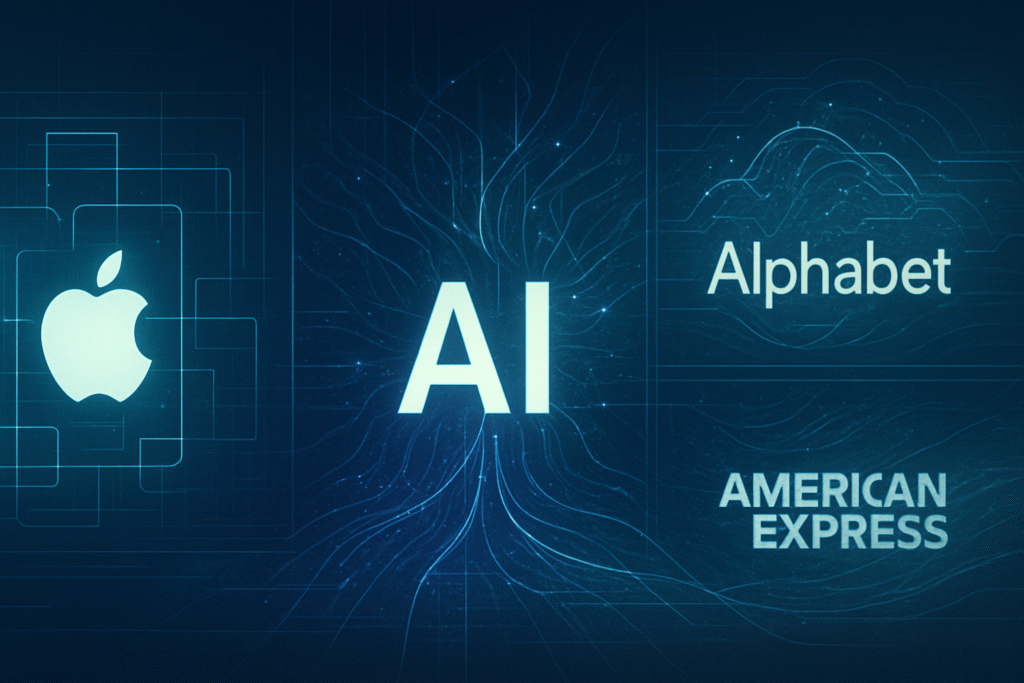Warren Buffett’s Quiet Bet on the Future: Unpacking Berkshire Hathaway’s Strategic AI Investments

Berkshire Hathaway (NYSE: BRK.A, BRK.B), the venerable conglomerate led by Warren Buffett, has long been known for its disciplined, value-oriented investment philosophy, often shying away from the speculative fervor surrounding emerging technologies. Yet, a closer look at its formidable portfolio reveals a significant, albeit indirect, embrace of Artificial Intelligence (AI). Rather than chasing pure-play AI startups, Berkshire's strategy appears to integrate AI as a critical enabler within fundamentally strong, established businesses. This approach reflects a cautious yet confident belief in AI's transformative power, primarily through companies that are leaders in their respective fields and leverage AI to enhance their core operations, competitive advantages, and profitability.
The recent significant investment in Alphabet (NASDAQ: GOOGL), coupled with long-standing positions in Apple (NASDAQ: AAPL) and American Express (NYSE: AXP), highlights a nuanced strategy that prioritizes AI's application within proven business models. This article delves into these top three AI-related holdings, examining their individual AI strategies, technical capabilities, and how Berkshire Hathaway's quiet conviction in these tech-forward giants could reshape perceptions of traditional value investing in an AI-driven era.
The AI Engines Within: Apple, Alphabet, and American Express's Technical Prowess
Berkshire Hathaway's top three AI-related holdings—Apple, Alphabet, and American Express—each demonstrate distinct yet powerful approaches to integrating Artificial Intelligence into their operations and product offerings. Their technical capabilities showcase the diverse applications of AI, from on-device intelligence to vast cloud-based ecosystems and sophisticated financial fraud detection.
Apple (NASDAQ: AAPL), Berkshire's largest holding, is a pioneer in on-device AI, a strategy that prioritizes user privacy and performance by executing AI tasks directly on the device rather than relying solely on cloud servers. Its custom-designed A-series and M-series chips feature dedicated Neural Engines, specialized hardware accelerators capable of performing trillions of operations per second. This enables features like Face ID for secure authentication, Siri for natural language processing, advanced computational photography (e.g., Deep Fusion, Photographic Styles), and personalized suggestions across iOS, iPadOS, and macOS. Apple's approach differs from purely cloud-centric models by offering immediate processing, reduced latency, and enhanced data privacy, as sensitive user data often remains on the device. This strategy has garnered praise from privacy advocates and positions Apple to deliver highly personalized and responsive AI experiences directly to its vast user base.
Alphabet (NASDAQ: GOOGL), a substantial new investment for Berkshire, stands as a global titan in cloud-centric and platform-wide AI. Its AI capabilities span an enormous breadth, from powering the world's most used search engine to developing advanced autonomous driving systems. Technically, Alphabet leverages its vast data centers and proprietary Tensor Processing Units (TPUs) to train and deploy massive AI models. Its flagship generative AI model, Gemini, is a multimodal AI system designed to understand and operate across text, code, audio, image, and video. This technical depth allows Gemini to power new "AI Overviews" in Google Search, generate code, summarize content, and drive conversational AI experiences. Google Cloud offers a comprehensive suite of AI/ML services, including access to powerful models and infrastructure, including its Tensor Processing Units (TPUs), enabling businesses to integrate AI into their own operations. This approach contrasts with Apple's by focusing on large-scale data processing and model training in the cloud, offering unparalleled computational power and versatility for a wide array of AI applications.
American Express (NYSE: AXP), another long-held Berkshire investment, exemplifies the critical role of AI in enterprise-level operational efficiency and risk management. While not a "tech" company in the traditional sense, American Express heavily relies on sophisticated machine learning algorithms for real-time fraud detection and prevention. These systems analyze billions of transactions, identifying anomalous patterns and potential threats with remarkable speed and accuracy, significantly reducing financial losses and enhancing security for cardholders. AI also underpins their credit risk assessment models, automating and improving the precision of lending decisions. Furthermore, AI-powered chatbots and virtual assistants are increasingly integrated into their customer service operations, providing personalized support and streamlining interactions. This application of AI differs from the other two by focusing on back-end operational intelligence, where AI's ability to process vast datasets and identify complex patterns directly translates into tangible business benefits, such as reduced fraud and improved customer experience.
Competitive Implications and Market Positioning in the AI Era
Berkshire Hathaway's strategic investments in Apple, Alphabet, and American Express carry significant competitive implications for the broader AI landscape, influencing tech giants, established financial institutions, and emerging startups alike. These holdings validate the enduring power of companies that deeply embed AI into their core value propositions, rather than treating it as a standalone feature.
Apple's (NASDAQ: AAPL) robust on-device AI strategy positions it as a formidable competitor in the personal AI space, particularly as concerns around data privacy intensify. By performing AI tasks locally, Apple strengthens its privacy-centric brand image, potentially drawing users away from platforms with more extensive cloud data collection. This approach challenges other device manufacturers and software developers to develop more efficient on-device AI capabilities, driving innovation in edge computing and specialized AI hardware. Apple stands to benefit from continued consumer demand for secure, personalized, and high-performance AI experiences, reinforcing its ecosystem lock-in. Its competitive advantage lies in its vertically integrated hardware and software, allowing for optimized AI performance that others struggle to match.
Alphabet (NASDAQ: GOOGL) is at the forefront of the generative AI race, and Berkshire's investment underscores confidence in its leadership position. Alphabet's vast research capabilities, extensive data resources, and powerful infrastructure (TPUs) give it a significant edge over many startups and even other tech giants in developing and deploying cutting-edge AI models like Gemini. This strengthens its competitive stance in search, cloud computing (Google Cloud), and potentially new AI-powered applications. Companies reliant on Google's advertising ecosystem will likely see enhanced targeting and efficiency through AI, while competitors in cloud AI will face intense pressure to match Google Cloud's offerings. Alphabet is poised to benefit from the increasing demand for advanced AI models and services, leveraging its scale to democratize AI access while maintaining its market dominance.
American Express (NYSE: AXP), while not a direct AI product company, benefits immensely from its sophisticated use of AI in fraud detection and risk management. This provides a critical competitive advantage in the highly competitive financial services sector. By significantly reducing fraud losses and improving the accuracy of credit decisions, American Express can offer more secure and efficient services than competitors with less advanced AI capabilities. This technological edge translates into stronger customer trust and better financial performance. The company's strategic use of AI serves as a model for other traditional industries looking to leverage AI for operational excellence, demonstrating that AI's impact extends far beyond consumer-facing applications.
Ultimately, Berkshire's investments suggest a belief that the greatest beneficiaries of AI will be those companies that can seamlessly integrate it to enhance existing, proven business models, rather than those built solely on speculative AI technologies. This creates a challenging environment for AI startups that lack established revenue streams or a clear path to profitability, while reinforcing the market positioning of tech giants and incumbents who can leverage AI at scale.
Broader Significance: AI's Maturation and Investment Trends
Berkshire Hathaway's calculated foray into AI through its major holdings signals a profound shift in the broader AI landscape and investment trends. It suggests that AI is moving beyond its nascent, experimental phase and is now a critical, foundational technology that underpins the operations and future growth of even the most established global enterprises. This isn't about speculative bets on unproven AI concepts; it's about recognizing AI as an indispensable tool for enhancing efficiency, intelligence, and competitive advantage in mature, cash-generating businesses.
This investment strategy by a historically conservative investor like Warren Buffett validates the commercial viability and long-term impact of AI. It underscores that AI is not merely a technological fad but a fundamental driver of productivity and innovation across diverse sectors, from consumer electronics and internet services to financial operations. The move by Berkshire Hathaway, known for its emphasis on durable competitive moats, suggests that AI is now a crucial component of those moats for leading companies. This fits into the broader AI trend of "AI Everywhere," where AI is becoming embedded in virtually every product, service, and operational process, often invisibly to the end-user.
Potential concerns, however, include the risk of over-reliance on AI for critical functions, the ethical implications of AI deployment, and the ongoing challenge of talent acquisition and retention in the AI space. While Berkshire's chosen companies are well-equipped to manage these, smaller entities might struggle. Comparisons to previous AI milestones, such as the rise of expert systems or early machine learning, reveal a key difference: today's AI, particularly generative AI, is far more versatile, capable of autonomous learning, and integrated into complex, real-world systems. This marks a maturation from niche applications to pervasive utility, making it a more attractive, albeit still complex, investment for long-term holders.
The wider significance also lies in how this influences traditional investment philosophies. It demonstrates that even value investors, who prioritize understanding a business's fundamentals, must now account for technological integration, particularly AI, as a core part of that fundamental analysis. It's a recognition that ignoring AI means ignoring a critical factor in a company's future success and resilience. This could encourage other large, traditional funds to re-evaluate their tech exposure, not just in pure-play tech but in how established companies are leveraging advanced technologies to maintain their market leadership.
Future Developments: The Horizon of AI Integration
Looking ahead, the trajectory of AI integration within Berkshire Hathaway's top holdings—Apple (NASDAQ: AAPL), Alphabet (NASDAQ: GOOGL), and American Express (NYSE: AXP)—promises significant advancements and evolving applications. Experts predict a continued deepening of AI's role, moving beyond current capabilities to more predictive, personalized, and autonomous functions across these diverse sectors.
For Apple, the future will likely see an expansion of its on-device AI capabilities, pushing the boundaries of edge computing. Expect more sophisticated and contextually aware Siri interactions, proactive health monitoring features powered by AI, and even more advanced computational photography and video capabilities. Near-term developments will focus on enhancing user privacy while delivering hyper-personalized experiences, potentially through federated learning techniques that allow AI models to learn from user data without it ever leaving the device. Long-term, Apple's investment in its own silicon will enable it to run even larger and more complex AI models locally, potentially leading to truly intelligent personal assistants that anticipate needs and manage complex tasks autonomously. Challenges will include balancing performance with battery life and ensuring the ethical deployment of increasingly powerful on-device AI.
Alphabet's (NASDAQ: GOOGL) future in AI is geared towards ubiquitous intelligence across its vast ecosystem. Near-term, expect Gemini and its successors to become even more powerful and multimodal, integrating seamlessly into Google Search, Workspace, and Android. The development of more specialized AI models for various industries, delivered through Google Cloud, will also be a key focus. Long-term, Alphabet is likely to push the boundaries of AI research into areas like artificial general intelligence (AGI), advanced robotics, and more sophisticated autonomous systems (e.g., Waymo). The company will continue to leverage its massive data and computational resources to maintain its lead in foundational AI models. Challenges include managing the ethical implications of powerful generative AI, ensuring responsible deployment, and navigating the intense global competition in AI development.
American Express (NYSE: AXP) will further entrench AI in its financial operations, moving towards even more proactive and predictive capabilities. Near-term, this means enhanced real-time fraud prevention, leveraging AI to identify emerging fraud patterns faster and with greater accuracy. AI will also play a larger role in personalized financial advice, credit scoring, and customer relationship management, offering tailored products and services based on individual spending habits and financial goals. Long-term, expect AI to drive greater automation in back-office operations, potentially leading to more efficient processing of claims, disputes, and regulatory compliance. The challenge for American Express will be to continuously adapt its AI models to evolving fraud tactics and market conditions, while ensuring fairness and transparency in AI-driven financial decisions.
Experts predict that the convergence of these AI advancements will lead to more intelligent environments, where devices, services, and financial systems anticipate user needs and operate with greater autonomy. The coming years will be crucial for these companies to solidify their AI strategies, address ethical considerations, and continue to innovate at a rapid pace to maintain their competitive edge in an increasingly AI-driven world.
A New Chapter for Value Investing in the Age of AI
Berkshire Hathaway's significant, albeit indirect, investments in Artificial Intelligence through its major holdings in Apple (NASDAQ: AAPL), Alphabet (NASDAQ: GOOGL), and American Express (NYSE: AXP) mark a pivotal moment in the intersection of traditional value investing and cutting-edge technology. The key takeaway is clear: AI is no longer a niche technology for speculative ventures but a fundamental enabler for established, high-quality businesses to sustain and grow their competitive advantages. This strategic embrace by one of the world's most respected conglomerates signals a maturation of AI, validating its commercial impact across diverse sectors.
This development holds significant importance in AI history, demonstrating how even the most cautious investors are recognizing AI's profound and pervasive influence. It underscores that the "smart money" is not necessarily chasing the latest AI startup but rather identifying companies that can effectively integrate AI to enhance existing, durable business models. This approach mitigates the inherent risks of early-stage tech investments while still capturing the immense upside potential of AI's transformative power. The strategic choices of Apple's on-device intelligence, Alphabet's cloud-centric and platform-wide AI dominance, and American Express's operational AI prowess illustrate a comprehensive understanding of where AI truly adds value.
For the long term, this strategy suggests that companies capable of seamlessly weaving AI into their core operations will be the ones that thrive. It redefines what constitutes a "durable business" in the 21st century, firmly placing technological leadership, particularly in AI, as a critical component. Investors should watch for how these companies continue to innovate their AI capabilities, how they address ethical considerations surrounding AI deployment, and how their AI-driven efficiencies and product enhancements translate into sustained financial performance. The coming weeks and months will reveal further details of their AI roadmaps and how these investments continue to shape the future of AI-powered commerce and technology.
This content is intended for informational purposes only and represents analysis of current AI developments.
TokenRing AI delivers enterprise-grade solutions for multi-agent AI workflow orchestration, AI-powered development tools, and seamless remote collaboration platforms.
For more information, visit https://www.tokenring.ai/.
More News
View More




Recent Quotes
View More
Quotes delayed at least 20 minutes.
By accessing this page, you agree to the Privacy Policy and Terms Of Service.